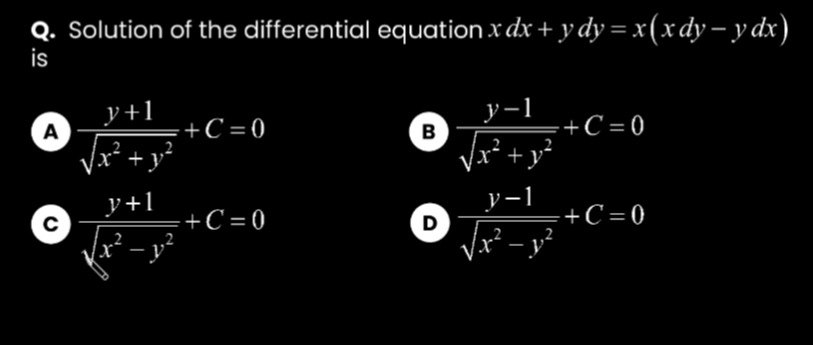Question
Question: Solution of the differential equation $xdx + ydy = x(xdy - ydx)$ is...
Solution of the differential equation xdx+ydy=x(xdy−ydx) is

x2+y2y+1+C=0
x2+y2y−1+C=0
x2−y2y+1+C=0
x2−y2y−1+C=0
x2+y2y+1+C=0
Solution
The given differential equation is: xdx+ydy=x(xdy−ydx)
This equation can be simplified using polar coordinates. Let x=rcosθ and y=rsinθ. From these substitutions, we have the following standard differential relations:
- x2+y2=r2 Differentiating both sides: 2xdx+2ydy=2rdr⟹xdx+ydy=rdr.
- The term xdy−ydx can be related to dθ. xdy−ydx=(rcosθ)(drsinθ+rcosθdθ)−(rsinθ)(drcosθ−rsinθdθ) =rdrsinθcosθ+r2cos2θdθ−rdrsinθcosθ+r2sin2θdθ =r2(cos2θ+sin2θ)dθ=r2dθ.
Now, substitute these into the original differential equation: rdr=(rcosθ)(r2dθ) rdr=r3cosθdθ
Assuming r=0, we can divide both sides by r: dr=r2cosθdθ
Now, separate the variables r and θ: r2dr=cosθdθ
Integrate both sides: ∫r2dr=∫cosθdθ ∫r−2dr=∫cosθdθ −r1=sinθ+K (where K is the constant of integration)
Rearrange the terms: r1+sinθ=−K Let C=−K (since K is an arbitrary constant, −K is also an arbitrary constant). r1+sinθ=C
Finally, substitute back the Cartesian coordinates: r=x2+y2 sinθ=ry=x2+y2y
So the solution becomes: x2+y21+x2+y2y=C x2+y21+y=C
This can be written as x2+y2y+1−C=0. If we redefine the constant as −C, it matches option A. x2+y2y+1+C′=0 (where C′=−C).
The given differential equation xdx+ydy=x(xdy−ydx) is most efficiently solved by transforming it into polar coordinates. By substituting x=rcosθ, y=rsinθ, we use the identities xdx+ydy=rdr and xdy−ydx=r2dθ. The equation simplifies to rdr=rcosθ(r2dθ), which further reduces to r2dr=cosθdθ. Integrating both sides yields −r1=sinθ+C′. Substituting back r=x2+y2 and sinθ=x2+y2y gives x2+y21+y=C, which matches option A.
